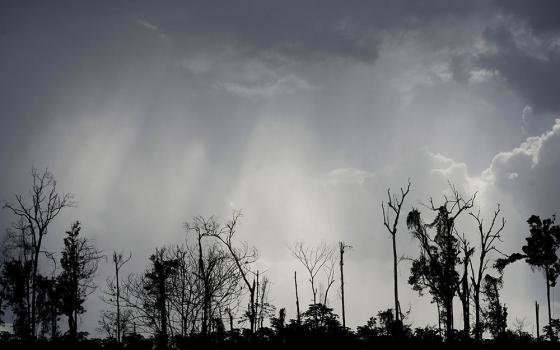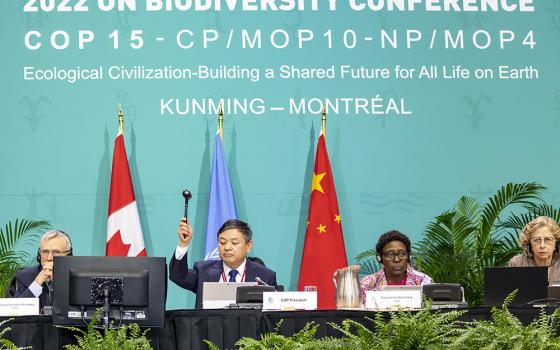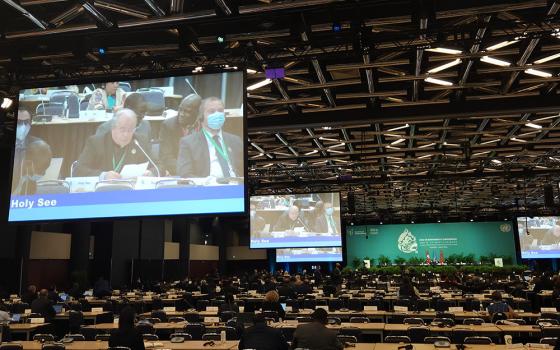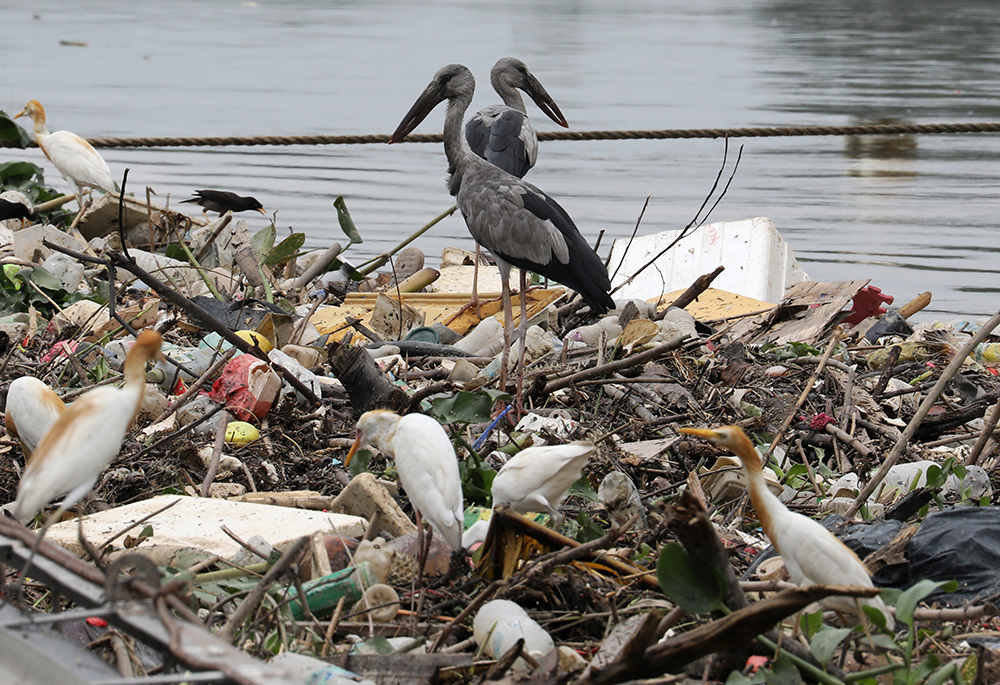
Birds search for food on trash collected by a log boom on a river in Klang, Malaysia, on World Environment Day, June 5, 2020. The theme of World Environment Day 2020 was "Celebrate Biodiversity." (CNS/Reuters/Lim Huey Teng)
Nations are gathering in Canada this week to complete a global, once-in-a-decade conservation pact to protect ecosystems amid increasing threats to biodiversity and warnings that upwards of 1 million species could face extinction by century's end.
Along with government officials and activists, representatives of the world's religions will also be in Montreal for COP15, the United Nations biodiversity summit, where they hope to raise both moral principles and policy priorities on preserving creation.
"We are linked to the rest of creation," said Servite Friar Fr. John Pawlikowski, a member of the climate change task force of the Parliament of World Religions and one of its four delegates in Montreal. "We have to develop a positive notion of the goodness of creation, of our fundamental links to the rest of creation, and that the rest of creation impacts our own existence as humans."
COP15, the 15th Conference of the Parties of the U.N. Convention on Biological Diversity, opens Dec. 7 and is scheduled to continue until Dec. 19. Formed in 1992, the convention sets global biodiversity targets once a decade.
The latest convening is expected to finalize a post-2020 global biodiversity framework that will outline conservation efforts toward stabilizing biodiversity loss by 2030 and bringing about ecosystem recovery by 2050. The global biodiversity framework, or GBF, has been deemed a potential "Paris moment" on conservation, a reference to the landmark 2015 Paris Agreement that nearly all nations have adopted to address the emergency of climate change.
At the core of the GBF is a proposal to protect 30% of public lands and waters for conservation by 2030 — a figure some environmentalists and Indigenous communities have criticized as far too low while some nations are hesitant to commit to that much at all.
A major U.N.-commissioned report in 2019 illustrated a picture of biodiversity under threat.
Upwards of 1 million animal and plant species are at risk of extinction, and some biologists have said the planet is on the brink of the sixth mass extinction, one primarily driven by human activities. Human actions have also significantly altered three-quarters of land-based environments and 66% of marine environments, according to the U.N. report, while greenhouse gas emissions have doubled and plastic pollution has increased tenfold since 1980. U.N. officials and environmentalists have repeatedly referred to climate change, biodiversity loss and pollution as a triple planetary crisis.
"Even in my worst nightmares, I never imagined that things would be destroyed this quickly as they're happening before my eyes now," said Rosa Maria Ruiz, a conservationist who has worked with Franciscans in her native Bolivia, where logging and mining have decimated forests, mountains and waterways, and populations along river systems are experiencing elevated levels of mercury in their bodies.
"The sheer madness of this is something that's difficult for me to cope with," she told EarthBeat.
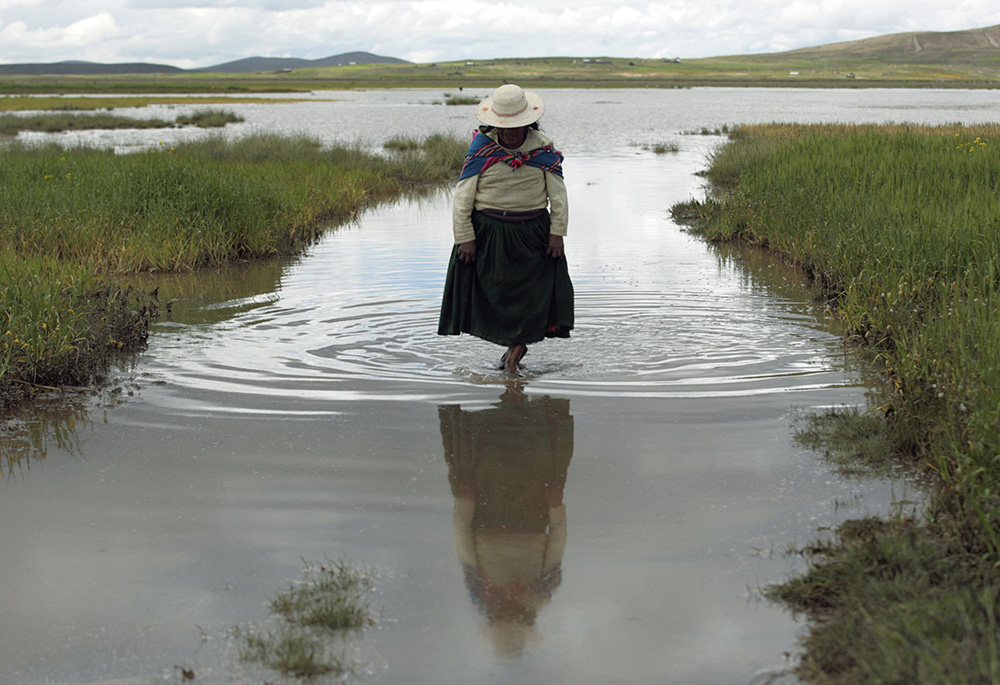
An indigenous woman is pictured in a file photo wading through floodwaters on a farm after heavy rains near La Paz, Bolivia. (CNS/Reuters/Gaston Brito)
Beyond the "30x30" proposal, the current draft of the GBF includes goals to reverse species extinction rate and reduce it by at least 10%, eliminate invasive species, reduce pollution, and increase sustainable management of forests and agriculture. A potential $700 billion annual global biodiversity fund, how businesses are held accountable for biodiversity loss, and mechanisms to implement and monitor commitments are all expected to be contentious topics in a potential framework seen by activists as especially critical since countries failed to meet a single biodiversity target they set in 2010.
The details will be the focus of negotiations for the 13 days of COP15 among the 196 parties to the convention on biodiversity (195 countries and the European Union). Only the United States and the Vatican are not part of the convention, though both will send delegations. The U.S. has been active in negotiations, has backed the "30x30" plan, and in September President Joe Biden appointed Monica Medina as the country's first special envoy on biodiversity and water resources.
The international meeting in Montreal is the second half of one begun in October 2021 virtually, though situated in China, which is serving as COP15 president. The COVID-19 pandemic has delayed the convention nearly two years, as the Chinese city of Kunming was supposed to play host, but continuing health concerns with the coronavirus relocated the summit to Montreal, where the convention secretariat is headquartered.
The delay created by the pandemic has allowed more time for preparation, said Amy Echeverria, international coordinator for justice, peace and integrity of creation for the Missionary Society of St. Columban who will be a COP15 delegate and has participated in preparatory meetings.
"It has given so many other groups time to organize ourselves in a way that just wouldn't have been possible had [COP15] happened in May of 2020," she said.
Greater faith focus on biodiversity
A contingent of roughly three dozen people of faith from more than 20 organizations are expected to be among the 10,000 registered delegates to COP15, in what's seen as the largest religious showing at a biodiversity conference. A multifaith coalition will host a faith pavilion within the summit's main venue with daily presentations and panels, and faith leaders will also hold an official side event on Dec. 8.
In recent years, faith groups have increasingly sought to tie responses to climate change with efforts to preserve ecosystems — or in religious parlance, creation.
Pope Francis in his message for the 2022 Season of Creation described "the double crisis of climate change and the reduction of biodiversity," saying that creation is bellowing "an anguished plea, lamenting our mistreatment of our common home."
"Listening to these anguished cries, we must repent and modify our lifestyles and destructive systems. … The present state of decay of our common home merits the same attention as other global challenges such as grave health crises and wars," Francis said.
The multifaith coalition of 28 faith-based organizations from around the world drafted its own set of proposals, recommendations and key messages for delegates to consider in finalizing the global biodiversity framework. They outlined six major priorities, including: more ambitious targets to put biodiversity on a recovery path by 2030; greater recognition of the interconnected sources and solutions to biodiversity loss, climate change, pollution and waste; higher emphasis on a rights-based approach throughout the framework; and the need for an implementation mechanism and closing of financial gaps. In addition, the coalition outlines specific revisions and rationales for most of the proposed framework's 20-plus targets.
As coordinator of the multifaith coalition, Gopal Patel has been leading efforts over the past two years to mobilize faith actors to bring spiritual urgency to advocacy around biodiversity, something he says has been lacking compared to action around climate change.
Co-founder of the Hindu environmental group Bhumi Global, he told EarthBeat that the COP15 secretariat approached faith groups about having a larger presence, what he took as a sign that "they see the need, the urgency, the relevancy of moral, religious, ethical, spiritual voices in these conversations."
"This is the first time that a coalition of faith groups have come together, spanning almost every single major faith tradition, to say collectively, 'This is what we want to see, this is what we are urging world leaders to do,' " he said.
The multifaith coalition includes the Parliament of the World's Religions, the ACT Alliance, the Faith for Earth Initiative of the U.N. Environment Programme, the Buddhist Tzu Chi Foundation, Hazon, a Jewish sustainability group, Islamic Foundation for Ecology and Environmental Sciences, and the U.S.-based Interfaith Power & Light. Catholic members include the Columbans, Maryknoll, the Sisters of St. Joseph of Peace, and the Sisters of Charity Federation.
"To be in close relationship with the Earth, with other species, with plants, with the soil. That's what it is to be human. And I think when different faiths can come together around that, we get that message much more clearly," said Sr. Sue Wilson, executive director of the Office for Systemic Justice for the Federation of Sisters of St. Joseph of Canada.
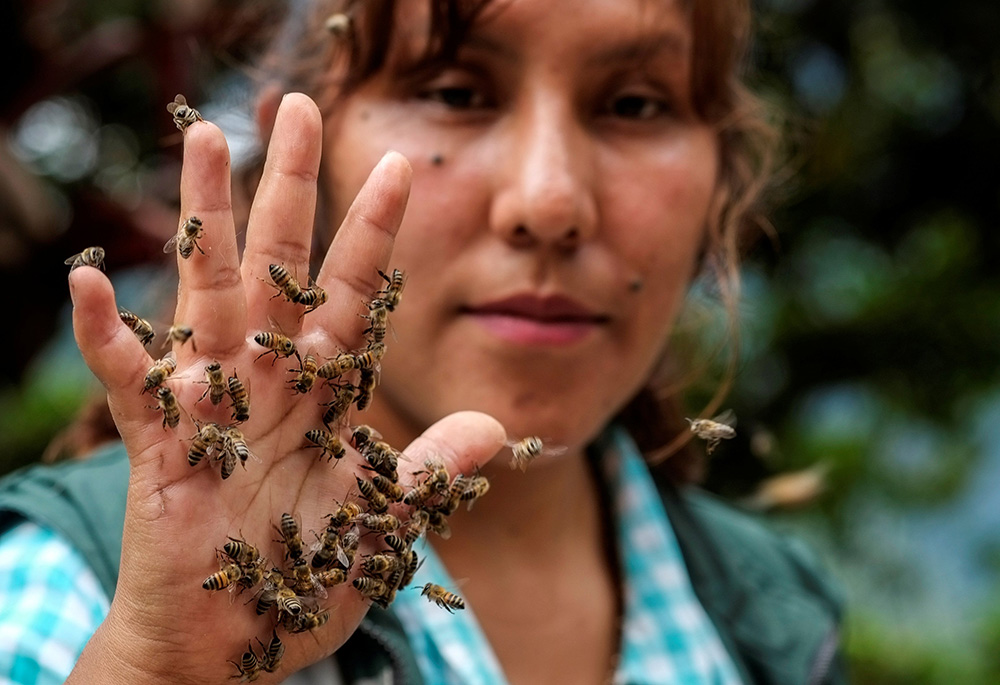
Cynthia Callizaya shows honey bees on her hand at her "Las Orquideas" (The Orchids) sanctuary in Bolivia's Yungas forest Jan. 13, 2021. Callizaya and her husband, zootechnical engineering vet Eric Paredes, are moving honey bees to a sanctuary they created to address a staggering decline in the insects' colonies due to deforestation and coca farming, which has encroached on their habitat. (CNS/Reuters/David Mercado)
Priorities for COP15
Ahead of COP15, the Joint Ecological Ministry issued a letter signed by 45 Catholic religious communities and organizations in Canada to the country's environmental minister urging that the country honors its current and past commitments to conservation, that it links biodiversity protection with climate mitigation and works with Indigenous communities in protecting lands without infringing their rights.
"The interconnected nature of biodiversity loss and climate change demand that new protected areas are chosen with the purpose of addressing both concerns at the same time. In addition, these efforts must be integrated with our responsibility to advance reconciliation with Indigenous peoples," the letter stated.
Wilson, also a delegate at COP15, told EarthBeat that Catholics in Canada are urging their leaders as the host nation to honor the commitments it makes in Montreal after often failing to deliver on past ones.
"We're looking for transparency, for clear targets and timelines, for public accountability on the commitments that we make," she said.
The role of Indigenous communities in conservation is expected to be another focal point at COP15. Studies have indicated that 80% of the world's biodiversity is on lands inhabited and protected by Indigenous peoples, who make up just 5% of the global population. Given that, tribes and their allies argue they should have a prominent voice in determining the final draft of the GBF.
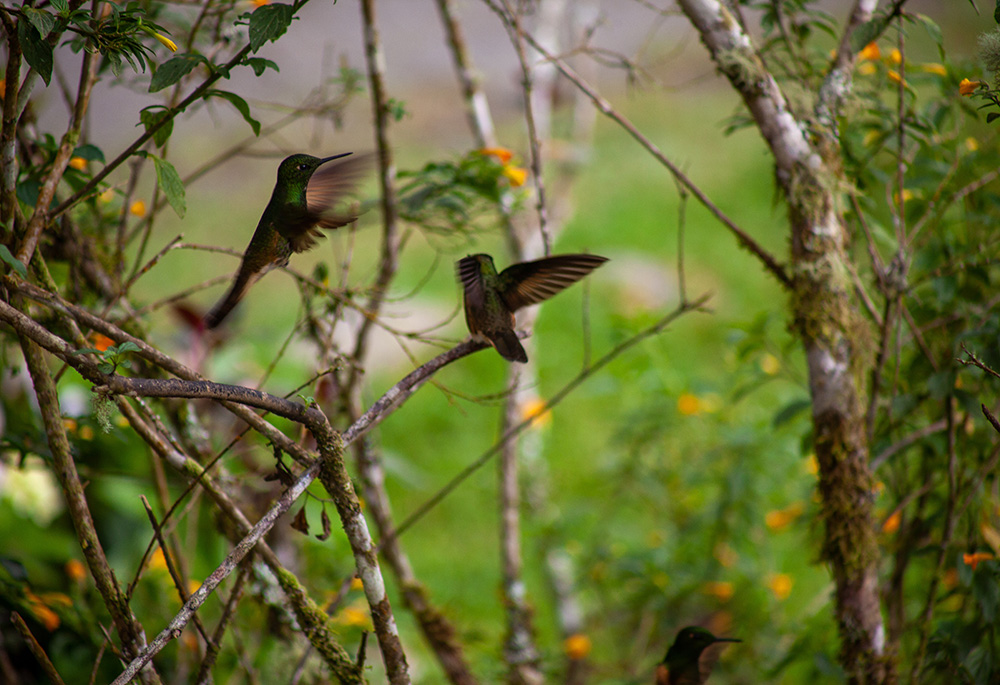
Two hummingbirds in a Colombian forest Jan. 23 in Caldas, Colombia (Unsplash/Backroad Packers)
Ruiz said it was of "utmost importance" that Indigenous communities be included in decision-making about biodiversity and for them to form international networks to create power and resist corruption.
"They've done a marvelous job of taking care of these areas for centuries. So where else would you get better advice than people who've actually done it, put it into practice?" the Bolivian conservationist said.
The Indigenous Leadership Initiative, a national Indigenous-led conservation organization in Canada, will host an Indigenous Village in COP15's opening days to showcase their leadership and sustainability strategies in caring for the earth.
Valérie Courtois, the initiative's director who is a professional forester and a member of the Innu community of Mashteuiatsh, wrote in a blog that she hopes COP15 will recognize the work of Indigenous communities in sustaining biodiversity, including in Canada where nearly 90% of protected areas established in the past two decades are led by Indigenous nations.
"Indigenous Peoples sustain lands and waters not just for our own interests," she said. "We do this because we have a responsibility given to us by the Creator to care for these areas for the benefit of everybody. We know that if we take care of the land, the land will take care of us — all of us."
In their recommendations, the multifaith coalition expressed concern that the proposed text for the GBF does not give enough attention to the "sacred wisdom" of Indigenous peoples and spiritual and faith-based communities.
The pope in his Season of Creation message outlined four key principles for COP15: constructing a "clear ethical basis" for biodiversity-saving efforts; combating biodiversity loss in a sustainable way; promoting global solidarity in efforts; and giving priority to people in vulnerable situations and most harmed by biodiversity loss, among them Indigenous, the elderly and youth.
"Delay on the part of others can never justify our own failure to act. It is necessary for all of us to act decisively. For we are reaching 'a breaking point,' " Francis said.
Moral presence, policy expertise
As much as being a moral presence in Montreal, faith groups who spoke with EarthBeat said it was just as important for them to be able to speak to specifics in terms of policymaking with the negotiations. That led them to develop the multifaith response, which they plan to distribute to delegates at the convention.
"We want to showcase that beyond giving sermons and lectures and planting trees, which is all good, we're also concerned about, and we can also talk about, the actual policy and the nuts and bolts of the global biodiversity framework," Patel said.
Several members of the multifaith coalition will be closely tracing the negotiations, and participating in plenaries and contact group sessions to push their priorities. Others will be working to make the faith community visible, attending events, speaking with as many people as they can and partnering with constituencies, whether Indigenous communities or nongovernmental organizations like World Wildlife Federation and Conservation International.
While access is often limited at the U.N. climate summits, faith actors are expecting COP15, with fewer participants and historically less media attention, to be more accessible and negotiators more approachable.
Looking to build off their work on climate change, the Columbans in late 2019 formed a working group of its members in countries like the Philippines and Pakistan as they looked to play a part in the biodiversity summit. They have advocated their concerns with leaders in countries where they have a presence, especially in calls for a more circular economic model, the connections between biodiversity collapse and migration, and the role militaries play in destruction of ecosystems.
Echeverria said she is heading to COP15 without expectations for the final framework countries may reach.
"What comes out of Montreal, we know there's going to be more work to be done. We don't know exactly what the work is yet, we'll find that out when the negotiations are finished," she said.





